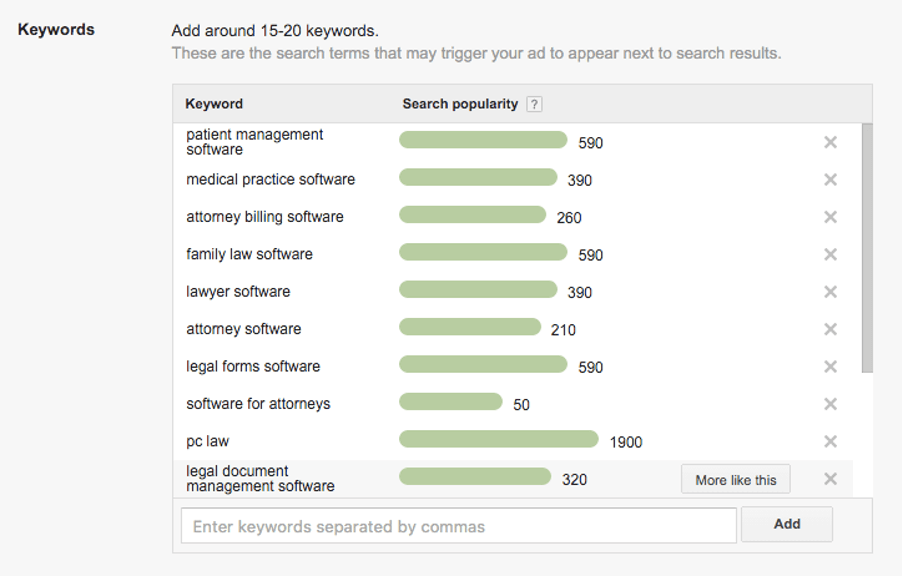When you’re in need of a service, where do you turn?
If you’re like most people, the answer is probably online. The same holds true for legal services: today, the vast majority of people head online to search for a lawyer who will best fit their needs.
Two of the most common search methods are:
- Using an online search engine
- Visiting a lawyer’s website
In fact, the Legal Trends Report found that firms that use online search ads were hired 25% faster than firms that don’t.
With so many people turning to the digital world, pay-per-click (PPC) can be an excellent way for lawyers to reach potential clients and bring in new business. That’s because these ads let you target specific types of clients looking for specific types of law services, sharpening your marketing efforts to improve client acquisition.
In this comprehensive guide to law firm PPC, we’ll explain how you can optimize your campaigns for success. By following these nine tips, you’ll ensure ROI is high—while minimizing your costs.
What is PPC for law firms?
Pay-per-click, or PPC, is an online paid advertising model in which advertisers pay a set amount each time a site visitor clicks on their ad. When done right, PPC can help lawyers achieve quality leads.
Does Google ads work for lawyers?
If you’re looking to advertise on Google, Google Ads can make a powerful difference in a law firm. These ads have the potential to reach the right clients at exactly the right time—bringing in a consistent stream of business.
However, it’s worth noting that the advertising campaigns that yield a high return on investment require time and testing. Expect to go through a learning phase before seeing highly successful results.
But don’t worry—you won’t be on your own as you begin your journey to embrace PPC for personal injury lawyers, family lawyers, or criminal defense attorneys.
Google Ads provide various educational resources to get you started, including best practices. While setting up an account for the first time can feel daunting given Google Ads’ multiple campaign options, don’t be discouraged. The process is worth learning because it’s easy for law firms to lose money through poorly executed PPC advertising campaigns.
9 Tips for attorney PPC advertising success

1) Write ad copy that potential law firm clients can’t ignore
Use your ad copy to tell search users—in other words, your potential clients—what makes you a better lawyer than your competition. Be sure to support this statement with a call-to-action, such as “Call Now” or “Book a Meeting.”
It’s important to remember that copywriting requires experimentation to determine which message resonates the most with users. The point is to get them to click through to your website and ultimately book a meeting with you to discover how you can help them.
To do this, try setting up different ad versions and letting them run for a week. This way, you can see which ones perform the best and reallocate your budget accordingly
2) Use keywords in your legal ad copy
PPC for lawyers is subject to the same ranking criteria as PPC ad campaigns across every industry.
Like Google Ads, PPC engines score your ad based on audience relevance and helpfulness. The more relevant your ad copy is to the keywords you’re bidding on, the higher the Quality Score Google uses to rank your ad. The Quality Score is a significant metric because it determines where your ad appears and your cost per click.
Here are a few tips for using keywords in your law firm PPC ads:
Use your keyword in the headline and ad content
This technique requires careful consideration because you won’t have much space for copy. You also need to consider your benefit statement and CTA. Use specific phrases like criminal defense lawyer or personal injury lawyer in your ad content.
Bid on long-tail keywords
Long-tail keywords like “affordable personal injury lawyer” have less competition, which makes them more affordable. In addition, they enable you to identify a more targeted audience.
Consider using dynamic keyword insertion
This feature uses the searcher’s exact search query in your ad and enhances the relevance to them.
For more tips on keywords and keyword research, visit our guide on SEO in our digital marketing for law firms hub.
3) Use the keyword planner
The Google Ads keyword planner helps you research new keywords by analyzing your (or your competitor’s) website to find relevant keywords. You can use these relevant keywords in your law firm’s PPC campaigns.
The benefits of using the keyword planner include:
- Discovering new keywords that are relevant to your law firm and target audience. You’ll get suggestions for keywords related to your legal services and website.
- Seeing estimates of searches your keywords get each month.
- Determining your PPC ad campaign budget. For instance, researching terms like “personal injury lawyer” or “family lawyer” can reveal search volume and help you estimate costs.
For example, using the keyword planner to search for “www.clio.com,” these keywords below come up:

We can see that the most popular search term is “pc law,” while a more specific keyword such as “software for attorneys” yields a lower volume.
Generally speaking, more generic, broader keywords with higher search volumes are more competitive and costly to bid on. However, lower-volume, long-tail keywords are more affordable. For your keyword strategy, it’s a good idea to select a mix of high- and lower-volume keywords to use in your PPC ads. This helps balance the cost of your total campaign spend.
For more on keywords, be sure to check out our resources on SEO in our digital marketing hub.
4) Cut costs by using different match types

Law-related search terms can be expensive if you’re targeting general terms. Google Ads uses keyword match types which dictate when your ad shows up, depending on what gets searched.
For example, you could use a “broad match” to show your ad to a wide audience or an “exact match” to target specific groups of potential clients.
When you use different match types, two things happen:
- Your relevancy potentially increases
- Your PPC cost may decrease
There are four match types available:
Broad match
Close variations of your selected keyword, related searches, and other relevant variations will trigger Google to display your ad to the user. With this type of matching, you don’t necessarily have to use the exact keyword in the search.
Broad match modifier
With this type of matching, you’re able to include any keywords that are variations or close to your identified keyword using a + sign. These additional words can appear before, after, or between the terms.
For example, if you want to target “family lawyer cost in Maryland,” you can add +rate or +price so that you capture any search terms that might use those words instead of “cost.”
Exact match
Google will show your ads in search results that are based on exact matches of your keyword or close variations of that exact term with the same meaning. If you’re a firm running PPC for criminal defense lawyers, using specific phrases like “criminal defense attorney in [city]” can help you avoid irrelevant clicks.
Phrase match
Google will trigger your ad for matches of the phrase (or close variations of the phrase) with additional words before or after. For example, if “family lawyer in Maryland” is your keyword, your firm will show up for searches that include “best family lawyer in Maryland” and “family lawyer in Maryland reviews.”
5) Target the location of your law firm

Do you practice in a specific geographic area?
If so, you can save money on your law firm PPC ad campaigns by only showing them to potential clients in the area that you practice. If you’re a bankruptcy lawyer in New York, there’s no point in paying for clicks from California. Set geographical parameters to ensure your ads target the right audience. This is especially beneficial for high-cost services like civil litigation PPC campaigns.
Set geographical parameters based on the user’s locations. You’ll be able to prevent your ad from showing up outside of your area, thereby reducing the amount of money spent on clicks that will not convert into new business. This is especially helpful if your keywords have a high cost-per-click.
6) Use ad extensions to boost click-through rate (CTR)
In legal matters, time is crucial. Potential new clients want to connect quickly to assess if your law firm is the right fit.
Likewise, you want potential legal clients to easily get in touch so that you can generate new business with the right audience. To simplify the experience for both parties, using Google ad extensions is a great solution.
Ad extensions include:
- Call buttons
- Location information
- Links to specific parts of your website.
According to Google, they typically increase an ad’s CTR by several percentage points.
If a potential client is quickly searching for an attorney on their smartphone, they’re going to click on the first one that has a phone number visible in the ad. Having to click through to the website and search for the law firm’s phone number is too much work.
7) Make sure your firm is advertising on mobile
Smartphones and other mobile devices are becoming ubiquitous. In 2021, nearly half of smartphone users in the US spent an average of five to six hours per day on their devices. In addition, mobile devices make up nearly half of web traffic worldwide.
To achieve the biggest impact with your law firm PPC ad campaigns, make sure you set the ads up for mobile. For example, a personal injury lawyer PPC campaign targeting smartphone users can result in more calls and inquiries from those needing urgent help.
Previously, many law firms have shied away from Google Ad mobile PPC campaigns—in large part because of the complexity and time commitment required to manage them properly. However, the introduction of Google’s Enhanced Campaigns has made mobile ads much simpler to implement.
Mobile PPC ads for lawyers can drive calls and mobile website visits—an excellent way to land new clients. To get the most out of your law firm’s digital ad spend, Google outlines five mobile advertising strategies to help you capture customers on the go.
8) Leverage Local Services Ads
In short, Local Services Ads are pay-per-lead ads offered through Google that appear at the top of search engine results. They match prospective customers searching for a service with relevant businesses in the same area. The result? Customers get reliable suggestions, while companies see a better return on investment with more qualified leads.
Even better, with Google’s Local Services Ads for Clio, you can sign up for and manage a Local Services Ads account, set up and run ad campaigns, capture new leads, and measure campaign performance all within a single platform.
Here are some of the additional benefits:
- Build client trust: Earn a “Google Screened” badge verifying your business is qualified to offer legal services.
- Control your budget: Set your weekly budget and pause your ad at any time.
- Pay for results: Only pay when a potential lead contacts you through the ad, resulting in higher quality leads and cases. Plus, new Google Ads users will receive $500 in ad credits when they spend $500.
Learn more here, or book a live demonstration with a Clio expert.
9) Optimize your law firm’s website

PPC for lawyers can be a very effective way to bring traffic to your firm’s website.
But if your website doesn’t provide relevant, timely information that potential clients seek, potential clients won’t end up booking a call. Why spend money on clicks if you don’t have an effective strategy to convert them into new business?
To optimize your website for lead conversion, here are a few tips:
Make sure your copy is straight to the point
Google loves websites that provide immediate answers to user inquiries. While it’s tempting to write copy that appeals to a broad audience to attract more visitors, this approach often creates a poor user experience.
Use the same or similar keywords from your PPC ad campaigns in your content
Don’t fixate on volume. It’s quality over quantity. Focus on the best way to create website content that drives education and conversion.
Include consistent imagery and branding used in your law firm PPC ad campaigns
Visuals on your website are integral to the user experience, creating interest and engaging visitors. Nothing encourages a user to bounce faster than encountering a wall of text.
Read our list of the 20 best law firm websites for inspiration.
10) Review your analytics and perform regular testing

Conducting regular audits of your law firm’s PPC ad campaigns is crucial. It ensures the right audience is seeing your ads, users are clicking through to your website, and you’re staying within budget.
Google’s analytics will let you know which campaigns have been successful. Conversely, it will identify which ones need to be further optimized or dropped altogether. When conducting your analysis, there are five metrics that will give you the best overview of performance and actionable insight.
Quality Score
The Quality Score is Google’s way of measuring how relevant your keywords are compared to user searches. It ensures that searchers see relevant ads and have a positive experience.
The factors that determine your Quality Score include:
- Your ad’s click-through-rate (CTR)
- The keyword and ad’s relevance to the search query
- Your landing page’s quality
Click-through Rate
This measurement is one of the most important factors in determining your Quality Score because it reflects whether or not your ads are relevant to users. A low CTR indicates that you need to improve your keywords or ad creative (or both).
Conversion Rate
This metric tells you the percentage of people who clicked your ad actually ended up completing your CTA on the landing page. Conversion rate is just as important as CTR—you don’t want to pay for clicks and traffic that don’t end up converting into business.
Cost Per Conversion
One of your goals is to keep the cost to bring in new business as low as possible. If you have to pay more to acquire a new client than the client is worth to your business, your return on investment is poor.
Wasted Spend
This metric reflects the amount of money wasted on ad clicks that are not converting. The best way to reduce your wasted spend is by using negative keywords. Negative keywords allow you to filter out traffic that is irrelevant to your business and unlikely to convert.
Let’s talk law firm PPC budgeting
So you’re on board with the benefits of PPC for lawyers, and have a solid understanding of the tips to get started. Great.
The big question that’s likely on your mind now: “How much will it cost?”
This is a tricky one to answer. That’s because PPC campaigns respond to changes in algorithms and market trends, which can dramatically impact your ad spend.
Budgeting for other areas of your advertising and marketing campaign is relatively straightforward. You typically know how much it will cost to purchase an ad in a law journal or how much you need to set aside for a local networking event.
But budgeting for a legal PPC campaign can be challenging because you only pay when someone clicks your ad—and you can’t be certain how often that will happen.
Here are a few tips to help you navigate the budgeting process:
Set SMART PPC campaign goals
Everyone’s heard of SMART (Specific, Measureable, Achievable, Realistic, Timely) goals—and for good reason.
They’re an effective tool for setting realistic expectations for your PPC ad campaign and helping determine your ad spend.
- Specific: What outcome are you trying to achieve? Do you want to acquire 20 new clients this quarter? Are you aiming to increase brand awareness of your firm by getting 100,000 impressions from qualified potential clients?
- Measurable: Look to Google Ads and Google Analytics to provide conversion tracking data.
- Achievable: Do your PPC goals align with your historical website traffic and conversion metrics? You’re trying to determine if the estimated traffic for a specific time will convert into the required clients you need to meet your targets.
- Realistic: Do you have the resources and time you need to achieve your goals?
- Timely: Determine the length of your campaign, e.g., one month, one quarter.
Developing these kinds of SMART goals early in your PPC journey is especially helpful for collecting the data you need to inform future campaign budgets.
Start forecasting
We don’t expect you to predict the future—but having a realistic performance expectation can help you plan ahead.
Google Keyword Planner forecasts can be a helpful tool for estimating traffic and costs. You can gain insight into various metrics that will help you roughly forecast how much to allocate for your weekly, monthly, or annual PPC ad campaigns. These metrics include:
- Clicks: The number of clicks your ad might receive each day if the keyword triggered the ad.
- Cost: The average amount you might spend per day for this keyword.
- Impressions: How often your ad might show in a day. An impression is counted each time an ad is shown on a search results page.
- CTR: The ratio of the number of clicks that your ad might receive, divided by the number of times your ad might be shown.
- Average cost-per-click (CPC): The average amount you might pay when a user clicks your ad.
Forecasting with Google Ads Performance Planner
Google Ads Performance Planner is another forecasting tool that you may wish to explore as you plan your PPC ad spend. To help advertisers boost conversions, the tool focuses on driving incremental conversions by identifying the best spend amounts for your campaigns.
According to Google, “To give you the most accurate forecasts possible, Performance Planner takes into account billions of search queries, and is usually updated every 24 hours. Performance Planner then simulates relevant ad auctions in aggregate, including variables like seasonality, competitor activity, landing page, etc. It then forecasts conversions based on the conversion types in the ‘Conversions’ column of your Google Ads performance reports.”
In practical terms, a Google Ads Product Manager explains how it works:
“For example, let’s say you have a $92,000 monthly budget across 100 Search campaigns. The planner will recommend how to distribute that $92,000 across those Search campaigns to maximize conversions and project results from these changes in your forecast.”
One caveat?
Tools like Google Keyword Planner and Google Performance Planner rely on historical data (how the keyword performed in the past) to predict future performance. Search volume can vary greatly from month to month, or even daily, so don’t bet the farm on these projections!
Look back to move forward
Although you’ll need some campaigns under your belt to take advantage of your past performance data, analyzing month-over-month or year-over-year performance trends can yield valuable data to inform future budgets.
For additional insights, check out Search Engine Journal, which discusses three methods to estimate your PPC budget and the different bidding strategies you can test on search campaigns.
The bottom line on PPC for lawyers
We’ve just covered the basic foundational elements to law firm PPC. While it might seem daunting at first, understanding digital advertising is an essential skill that will help you obtain new business for your law firm on a continual basis.
To grow your practice, you need a constant healthy pipeline of qualified prospects. And one of the most important steps for collecting qualified leads is ensuring you have a strong case management and client intake system set up, like Clio Grow, which helps law firms automate the client intake process.
To learn more about how to build a streamlined process for finding and converting new leads, check out our article on generating healthy and qualified leads for your law firm.
How often should law firms review their PPC campaigns?
Law firms should regularly review their PPC campaigns to ensure they are performing optimally. A weekly review is recommended to monitor key metrics such as click-through rates, conversion rates, and cost per click. This allows for timely adjustments to bidding strategies, ad copy, and targeting settings. Monthly in-depth analysis can help identify broader trends and inform strategic changes.
Can PPC campaigns help law firms build their brand?
Yes, PPC campaigns can significantly aid in brand building for law firms. By consistently appearing in search results, firms can increase their visibility and establish a presence in the legal market. Well-crafted ads that reflect the firm’s values and expertise can enhance brand recognition and trust. Over time, this can lead to increased client loyalty and referrals.
What are some common mistakes law firms make with PPC advertising?
Common mistakes include not setting clear objectives, neglecting to use negative keywords, and failing to track conversions. Law firms might also overlook the importance of ad copy testing and landing page optimization. Another frequent error is not adjusting bids based on performance data, which can lead to inefficient spending. Regular monitoring and strategic adjustments are essential for success.
How can law firms ensure their PPC ads comply with legal advertising regulations?
Law firms should familiarize themselves with the advertising regulations set by their local bar association and ensure their PPC ads adhere to these rules. This includes avoiding misleading claims, ensuring transparency, and providing disclaimers where necessary. Consulting with a legal marketing expert can help navigate these regulations and ensure compliance while maximizing the effectiveness of the campaign.
What metrics should law firms focus on when evaluating PPC campaign performance?
Law firms should focus on metrics such as click-through rate (CTR), conversion rate, and cost per acquisition (CPA) to evaluate PPC campaign performance. These metrics provide insights into how well the ads are engaging potential clients and converting them into leads. Additionally, monitoring the quality score can help improve ad relevance and reduce costs. Regular analysis of these metrics can guide strategic adjustments.
